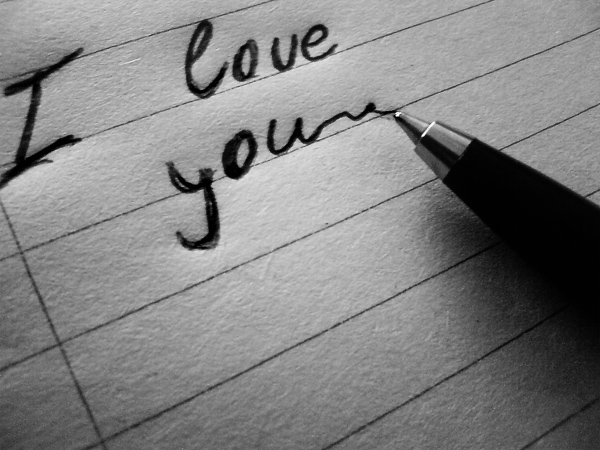"You are always new. The last of your kisses was ever the sweetest; the
last smile the brightest; the last movement the gracefullest. When you
pass'd my window home yesterday, I was fill'd with as much admiration as
if I had then seen you for the first time...Even if you did not love me
I could not help an entire devotion to you."
This is an excerpt from John Keats's love letter to Fanny Brawne, found in the book Bright Star: Love Letters and Poems of John Keats to Fanny Brawne. Although they knew each other for just a few short years and spent a great deal of that time apart due to Keats's worsening illness, which forced him to live abroad, Keats wrote again and again about Fanny - his very last poem is called simply "To Fanny" - and wrote love letters to her constantly. She, in turn, would wear the ring he had given her until her death.
Don't you agree that there is a certain allure in love letters? The thoughtfulness, the time devoted choosing the appropriate words, the handwriting, the unsteady hand when writing a moving segment, ... I don't think a WhatsApp message has quite the same effect on the receiver.
I strongly encourage you to listen to this podcast by Michelle Janning, a sociologist at Whitman College. Her talk, "Why Love Letters Matter, Even in the Digital Age", analyses how stuff matters in our social life, and how the things we save (and where we save them) says a lot about us. I have tried to summarize some of the aspects she discusses right below.
"Letters matter because they represent memory at both the individual and collective levels (...) Letters matter because they are the texts of our identities". They are useful for self-definition, who we are or who we don't want to be any more. But it is not only about them, when aggregated, they can give information about a collective memory.
M. Janning carried out an online survey of about 400 individuals in the USA, analyzing the use of paper letters (both in digital and paper formats), paper cards, emails, notes, Facebook messages, cell phones, landline use, Skype and Snapchat in romantic relationships. She wanted to map out the different meanings people attach to digital, audiovisual and paper communication, and how age and gender influence saving practices.
What different meanings do people attach to love letters? Her findings indicated that most people still save love letters (over 75%) even if they agree they are fading away. The most commonly noted assets of paper letter-writing were tangibility, sacredness, rareness and a tendency to promote intimate communication.
ICTs create a presence in absence for partners in long-distance relationships, and "meaning" to them is based on the ability to reach their partner quickly. However, the fans of paper letters rely on the romanticized image of life before ICTs when lovers are perceived to have spent more time on the singular task of communicating with one person at a time. The other side is really about their asynchronous nature, which allows them to be less inhibited and more strategic in self-presentation. Both writer and receiver exercise patience, and it always requires delay and inefficiency.
As regards the saving practices, Janning points out that "Possessions are extended selves that serve as memory markers." Saved objects help people remember relationships and stir emotions about a past relationship. Our digital versions of objects, because of their intangibility, are less a part of our selves, and they have different rituals of possession and disposition.
Age does not affect whether people save mementos. It is more common to save objects from romantic relationships than not to save them. Younger respondents are more likely to save digital letters than older respondents, but saving love letters is a timeless behavior that spans generations.
Gender affects whether people save relationship mementos. Women save more love letters, but when it comes to frequency, men revisit their saved love letters more than women.
Janning states that there are people who still write paper letters because to do so connotes a love and devotion that seems to be lost and she says that we need to be more thoughtful now, because it is not only the content that requires scrutiny by the writer, but also the format.
Her final advice: First, learn how to address an envelope; second, remember that individuals and relationships should think about what is most meaningful for them and their partner in their communication, that is, couples should intentionally discuss communication preferences.
I invite you to visit her blog, where she also looks into some other aspects, such as the location where people store love letters. Don't miss the "About" section and her explanation about the "between-ness" of life which I share, by the way.


No comments:
Post a Comment